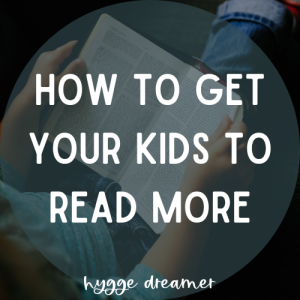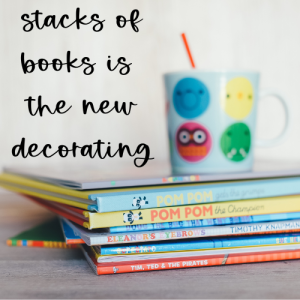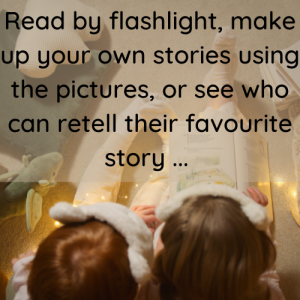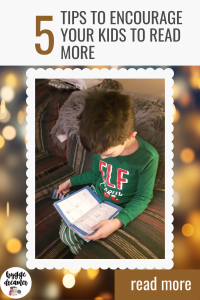
As parents, life is always throwing us curveballs. Just when we think we have everything under control, a new problem arises. One of those problems could be the success — or lack of success — when it comes to your child and their reading goals. Being an adult, you might think that reading should come naturally to your child. But reading, especially in the English language, can be a hard task to master. This post looks at different ways you can encourage your child to read more, as well as easy tips to foster a love of reading within your child — even when they’re feeling frustrated and want to throw their book across the room.
Here are 5 tips on how to raise a reader:
Have reading material available

Not all reading material comes in the form of a book. Of course, books are wonderful, and they should be available for your child to read, but children can also benefit from reading other things.
- OwlKids in Canada is a magazine subscription geared toward young readers. Chirp magazine is for kids aged 3-6, Chickadee is for kids aged 6-9, and OWL is for kids aged 9-13. These magazines are fun because they have engaging stories for each age group, funny jokes, and games and puzzles in each issue.
- National Geographic Kids is a magazine subscription geared towards kids aged 6-13. The issues have animal facts, animal records, animal stories, and lots of great animal pictures. This magazine is perfect for kids who love animals of all shapes and sizes!
- Joke books are wonderful to have around. Jokes are short to read, and they get kids laughing and wanting more. If you subscribe to your local newspaper, there is also usually a comic strip section that your kids might enjoy.
- Cooking can be a way to show your kids how words are used. Have your recipe out while you cook or bake together, and point out the different ingredients and instructions. As a bonus, you could also teach them a bit of math with your measuring cups and spoons.
- Scholastic also has a list of reading materials that aren’t books.
Kids are also very curious and love to look at books when they’re on tabletops, in bathrooms, and on shelves. I usually have a pile of books on my bedside table, on the coffee table, and stacked high on the bookshelves. Even if the reading material is too advanced for your child, it can be fun for emergent readers to flip through a book, pointing out the words they know.
Penguin has a collection of Little Black Classics that have various works of fiction, including poetry. Sometimes your child just wants to hear your voice, and reading poetry or even a classic can show them other styles of writing. It is important to show your child that not all reading happens in books. There is plenty of other material that can help them read.
Let them see you reading
Maybe you don’t love to read or can’t tolerate it at all, but one way your child will feel encouraged to read is by seeing you reading.
I have a confession: I love playing video games. When my kids see me playing my video game, they want to play theirs. Why? Because I’m showing them that’s what they can do when they have free time.
And while taking a video game break isn’t a bad thing, you could also have quiet reading mornings with your kids. Take an hour, if you can, and sit and read. Encourage your kids to pick up their books and read, too. Then, talk about what you’re reading together.
My nightstand is where I usually have a pile of books I’m reading. My kids both know that when I go to bed, I’m reading a book until I fall asleep. This has led my oldest to have his own pile of books by his bed. It’s very rare that he doesn’t go to bed reading at night; in fact, he’s even now put a flashlight by his bed to read with after I tell him it’s time for lights out. (And I will always make sure that the flashlight has a full battery charge!)
Read with them

Reading with your child is essential. When they’re little and can’t read on their own, of course, we, as parents, should be reading to our children. But what about when they can read?
Even as an adult, I don’t claim to know all the words in the books I read, so why, when my child can read through the entire Dog Man series on his own, would I expect that he could read through every book with no problem? Writing styles are different from book to book, and reading with my kids, having them read aloud, helps them to learn those hard or different words and get used to different writing styles.
But should our kids always read to us? Of course not. Have you ever listened to an audiobook? The way a narrator reads a book can be soothing, exciting, and sometimes even better than how you might read the book in your own head. Our kids love listening to us read aloud, whether they’re toddlers or big kids. It can be fun to have a chapter book going with your kids, reading a chapter out loud every night. You could also listen to an audiobook together or have an audiobook specifically for listening to in the car with your children. Having multiple ways of reading stories will teach your children that reading can be fun and absorbing in many ways.
Get a library card
Every year there are thousands of new books published. Did you know, “according to a study conducted by Google Books, there have been 129,864,880 books published since the invention of Gutenberg’s printing press in 1440.”?
That’s a lot of books!
Of course, as wonderful as it would be to own enough books to last us through an apocalypse, or a snowy winter where we’re trapped in our house, it’s not always possible. I’m sure we’ve all had that dream where we’re locked in a library or bookstore, surrounded by hundreds, if not thousands, of books. And maybe you already do have enough books to last your lifetime, but there are new books coming out every week that sound fascinating, and it would break anyone’s pocketbook to buy them all.
That’s where your library comes in. The library is the best place to get books, either without paying a cent or maybe having to pay a small fee for your membership. Even with having to pay for your library card, the benefit is access to hundreds of thousands of books.
Here in Alberta, we have what is called the TRAC Consortium. If your local library is registered with ME Libraries, you can have access to all of the books within those libraries. That is nearly three million books! On top of that, if you have an e-reader, you can take advantage of Overdrive or Libby to download books straight to your device.
With a library, your children can have the wonderful experience of going and browsing through the shelves and finding new authors and books to read, or they can download books in an instant to their e-reader or device to read. If your child loves being read to, or maybe you’re going on a vacation, you can even download audiobooks through the library the whole family can enjoy.
Librarians are also a great resource for you and your family. If your child, for instance, loves reading Dav Pilkey or Aaron Blabey, your local librarian should be able to help you find books in similar genres or styles to try and enjoy.
Celebrate their successes
Learning to read is a lifelong adventure. When your child first starts to learn, they (and you) might be frustrated with the struggle, but once they start reading more and more and you see their progress, it truly is an amazing thing.
The best way you can celebrate your child’s success in learning to read is to continue encouraging them. Reading is reading, so whether they like reading chapter books, graphic novels, magazines, etc., you should always encourage them to keep reading.
Some fun ways you can continue to encourage and celebrate your child on their reading journey include:
- Keep a list of the books they read. When they finish a certain amount of books, you can have a small prize they can choose from–maybe a new book, a bookmark, a flashlight to read with when it’s dark, or a trip to the library to get a new stack of books.
- Let them choose the book–but find new authors they might enjoy. My oldest loves graphic novels and can reread them over and over again. I am always on the lookout for another graphic novel or a book that’s funny and adventurous — his favourite — to try with him. When it comes time to read together, he can read some of his books, but then I’ll read another book to see if he likes it. Better yet, you could find a whole new series for them to enjoy!
- Embrace the Scholastic book fair. I understand that not everyone can buy something at the book fair, but if you can, let your child pick something new to read from it. While I can try and find books I know my kids will love, they also love looking at different authors and might come across something I didn’t see myself.
- Don’t feel bad if they don’t want to read right now. Everyone goes through patches where they either don’t want to read or they want to read a lot. Being an avid reader myself, I had an entire year where I struggled to read just one book. If it’s something they love to do, they will come back to it. So, if they have a few days or a week where they’re just not into reading, that’s okay. Keep modelling your love of reading to them, and they’ll come back to it.

But what if my child doesn’t want to read? Or what if they’re struggling to read?
Learning to read is an exciting time in any child’s life. Once they start, it’s hard to get them to stop! Traffic signs, product labels, grocery lists, text messages … everything is fair game for kids once they get the reading bug.
But this isn’t always the case. Reading can be exciting, but it can also be a struggle.
Reading. Is. Hard.
Why might your child not want to read?
- They are embarrassed to read out loud.
- They read some words wrong and decide reading might be too hard.
- They have been told that they shouldn’t read certain books, so they lose interest.
- They don’t have a designated reading time or a time of day devoted solely to reading.
They are embarrassed to read out loud.
In my opinion, the best way to get your child to read out loud is to read out loud yourself. Read funny books! Do the silly voices! Don’t just stick to serious books! Find all sorts of different book types and genres — read graphic novels out loud together, read joke books, read picture books. Show them that it’s fun to read out loud.
Another reason might be because of a speech impediment. My son was diagnosed with apraxia when he was 2.5 years old, and he struggled a lot with how to pronounce words clearly. When people don’t understand what you’re saying, you might not want to say things out loud. If this is the case, talk to your child’s teacher about how to help them with their reading. There are always solutions, and your child’s teacher is one of the best resources.
They decide reading is too hard.
Everyone makes mistakes when they read. Nobody knows all the words! Have you ever read a book where you pronounced a character’s name one way, and then you heard the author pronounce it the correct way and realized you were wrong all along? It happens all the time. You need to reassure your child when they mispronounce something that it’s completely normal and that they are still — and will always be — learning. Reading is a process, it doesn’t come naturally.
A good way to help your child would be to approach their teacher. Have a look at the books they’re learning to read and see how you can help. Their teacher is bound to have suggestions!
They have been told that they shouldn’t read certain books.
I am an adult reader, but I LOVE reading children’s books. I love reading young adult books. I love reading comics. There is no RIGHT book to read, and while books do have age recommendations, that doesn’t mean they can ONLY be read within that age range.
Here’s an example: I can honestly say that I don’t love the Diary of a Wimpy Kid book series. I don’t like the main character, and I find that he never learns anything by the book’s end. But my 9-year-old LOVES these books. Just because I don’t love them, I’m not going to tell him that he can’t read them. These books get him reading! Same thing with the Dog Man series. They are highly entertaining, but some people might look at them and say that they’re comics and that kids should be reading chapter books.
Let me tell you this: No one should ever tell you what you SHOULD be reading. Giving you a book recommendation is one thing, but no one should say that you shouldn’t be reading certain books because you’re too young or too old, or that you should be reading classics, or the book isn’t serious enough, etc.
Reading is reading.
They don’t have a designated reading time.
I will admit: Sometimes, my children are on their devices way too much. However, when bedtime comes, we ALWAYS read. They know that bedtime is a time devoted to books and reading together. They also know that when they’re in bed, they can curl up with a book until it’s time for lights out (and they both have flashlights in their rooms, and I never go in and take those away if they try to keep reading.).
Even if you just put aside 15-20 minutes a day to say, “this is the time we’re going to read,” that is still 15-20 minutes a day of reading.
If your child brings home reading every day, try to get to it right after school if you can. Spend 10 minutes going through their reading with them and make it a routine. Some people might say there are only 24 hours in a day, but there ARE 24 hours in a day; hopefully, you can find at least 10 minutes in those hours to read. You could even designate a certain time of day when the entire family sits and reads silently together.
When encouraging your child to read more, the important thing to do is not stress about what they’re reading and how much, but take cues from what they enjoy reading to get them to read more. Try to teach them that having free time is such a privilege and that reading a book is a wonderful way to lose yourself in that time.
Related Posts From Around the Web
- Maybe your child is reading too much? Here’s a great blog post by Alysa over at Everead on how to limit your child’s reading.
- Jennifer at Mommy Evolution also has a post on how to encourage your kids to read. I especially love her second tip!
- Erica from What We Do All Day has a wonderful post on getting kids to read. I have to admit, her first tip is my favourite!
How do you encourage your kids to read more? Do you model reading? Let me know some of the ways you encourage your kids to read in the comments below!

